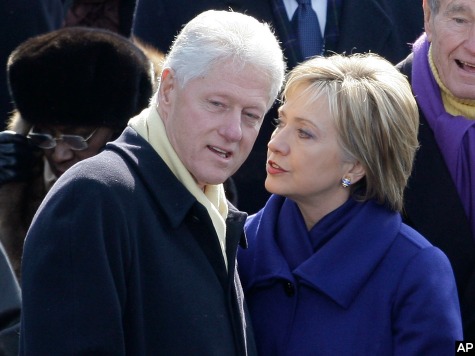Just ahead of a possible Hillary run for the presidency, the Clinton Library released a new load of documents from President Bill Clinton’s years in the White House. One of those documents attempts to explain Hillary’s “vast right-wing conspiracy” claim in which the Clinton administration accused Republican staffers of colluding with “extremists” on the Internet to hurt the Clintons.
On January 27, 1998, Hillary Clinton appeared on NBC’s Today Show. During her interview with Matt Lauer, she claimed that a “vast right-wing conspiracy” had been trying to destroy her husband “since the day he announced for president.”
That interview drew a lot of raised eyebrows and became a joke for years afterward. Hillary’s accusation became such a hot-button issue that Clinton’s White House felt it had to defend itself and drew up a full 28-page report to “prove” that there was, indeed, a “vast right-wing conspiracy.” This conspiracy was brewing, supposedly, among conservative think tanks, in conservative newspapers, and on that newfangled Internet thing, as all were colluding with the GOP to undermine the President.
The report, titled “Communication Stream of Conspiracy Commerce,” was intended to pinpoint who was behind “all this” and which “right-wing publications” were involved. It also tried to explain “the Internet influence.”
Interestingly, every method used by this “right-wing conspiracy” that the Clinton White House complained about in this report was to be later used by Clinton supporters, such as Clinton White House Chief of Staff John Podesta and conservative apostate-turned-liberal-extremist David Brock, to attack and destroy anyone on the center-right.
It is as if the left-wing attack machine with which we are all so familiar used this report as a blueprint to birth its own efforts at “conspiracy commerce.”
The report showed that the Clintonistas were particularly upset about the Internet, blaming the web for “bouncing” negative Clinton stories “all over the world.”
The White House laid out the process, charging that conservative think tanks created “fringe stories” out of whole cloth to get the ball rolling, then fed those stories to conservative newsletters. From there, the Internet picked them up. Congressional Republicans would then “investigate” the stories. Once that began, the “remainder of the mainstream press” then had its excuse to report it as a “real” story.
The White House report claimed that the conservative think tanks’ role was to “serve as the idea mill” for the GOP. “The think tanks define and shape the idea’s agenda for the party and serve as the training ground for this new generation of conservatives,” the report insisted.
It concluded its description with this strange comparison: “In many way, these Republican think tanks are to today’s media age of political organizations what the Democratic big city party machines were to the New Deal era of political organizations.”
This somewhat absurd comparison seems to show that the Clintons bestowed an outsized influence on conservative think tanks. After all, think tanks don’t strong-arm millions of votes like Democrat Party machines do. Think tanks don’t actually control anything. But big city political machines do. This inapt comparison shows just how paranoid the Clintons were about the influence of think tanks.
The report also fingered several people by name as culprits in the “vast right-wing conspiracy.” One was “the extremist” Richard Mellon Scaife, famed Republican moneyman and activist. Another was the “radical right-wing” Joseph Farah, prolific author and one of the men behind the conservative website WorldNetDaily.com (launched in 1997).
But the way the report described the Internet is particularly telling.
The Internet: The Internet has become one of the major and most dynamic modes of communication. The Internet can link people, groups, and organizations together instantly. Moreover, it allows an extraordinary amount of unregulated data and information to be located in one area and available to all. The right-wing has seized upon the Internet as a means of communicating its ideas to people. Moreover, evidence exists that Republican staffers surf the Internet, interacting with extremists in order to exchange ideas and information.
There couldn’t be a more telling entry that at once describes the left’s lock on the media, the left’s hatred of a free flow of information, and its hatred of the great unwashed having the gall to interact with Congress.
Note that this report was dripping with disgust over the “unregulated data” to which the Internet allows people access. Further, see that the Clintons were alarmed that this information was “open to all.”
Then, when the White House wrote, “The right wing has seized upon the internet as a means of communicating its ideas to people,” it was essentially admitting that before the Internet, conservatives had few avenues by which to reach the people. This was an open admission that the left fully controlled the media until the advent of the Internet.
Finally, the White House was incensed that Republican staffers would dare interact with those commoners on the Internet, calling we, the Internet people, “extremists.”
Yet, even as the White House complained about all this collusion and evil extremism, even as the White House decried the “unregulated data” that filled the web, Clinton’s own operatives took these models and created such left-wing propaganda outfits as the Center for American Progress–created by John Podesta in 2003–and Media Matters for America–launched by David Brock in 2004 after he remade himself into a liberal attack dog.
Follow Warner Todd Huston on Twitter @warnerthuston or email the author at igcolonel@hotmail.com.

COMMENTS
Please let us know if you're having issues with commenting.